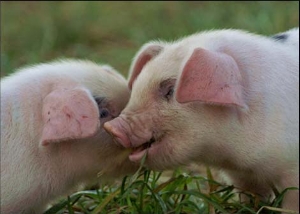 The European Parliament, the governing body of the EU (European Union), met last week to consider (among many other things) a new animal welfare action plan. Last December animal welfare became a core value for the EU, right up there with opposing discrimination, promoting gender equality, and protecting human health and welfare. The new animal welfare treaty states that EU members “shall, since animals are sentient beings, pay full regard to the welfare requirements of animals.” How civilized.
The European Parliament, the governing body of the EU (European Union), met last week to consider (among many other things) a new animal welfare action plan. Last December animal welfare became a core value for the EU, right up there with opposing discrimination, promoting gender equality, and protecting human health and welfare. The new animal welfare treaty states that EU members “shall, since animals are sentient beings, pay full regard to the welfare requirements of animals.” How civilized.
BBC News has a lengthy discussion of the implications of the treaty for animal experimentation. And here’s the complete Animal Welfare Action Plan, which was presented on April 19.
Seeking to capitalize on animal welfare sentiment during an election campaign, the UK’s Labour Party announced: “And we will maintain our proud record on improving animal welfare, including the ban on fox hunting.” How British.
Animal welfare and the animals we eat: Food Inc. and Fresh
On the agricultural front, the EU proposed banning the sale of meat from producers who violated animal welfare laws. One issue for Europe is that different countries have different standards. Lower standards mean lower prices, which provides a competitive advantage. This appears to be especially true for pigs and chickens.
Here in the US, for the most part, we try not to think about such things. We take it for granted that food is cheap and don’t ask why. Documentaries, such as Food Inc and the recently released Fresh, are beginning to raise awareness, which is great. I notice PBS has begun showing Food Inc, and you can now watch the film online at PBS. Fresh, which features Michael Pollan and Joel Salatin, is just now going into theatrical release.
Increasing antibiotic resistance could set health care back 100 years
Improving animal welfare for livestock animals has significant implications for antibiotic resistance. When animals are raised in closely packed feed lots, their health suffers, so farmers routinely included antibiotics in their feed.
 The matter is currently under consideration in Congress, but progress is slow. The meat industry is afraid of legislation that will forbid antibiotics for animals that aren’t sick, called subtherapeutic use. So they’re pushing back, as agricultural lobbyists know so well how to do. Former FDA commissioner Donald Kennedy, in a recent New York Times editorial, argued that legislation on this issue was 30 years overdue.
The matter is currently under consideration in Congress, but progress is slow. The meat industry is afraid of legislation that will forbid antibiotics for animals that aren’t sick, called subtherapeutic use. So they’re pushing back, as agricultural lobbyists know so well how to do. Former FDA commissioner Donald Kennedy, in a recent New York Times editorial, argued that legislation on this issue was 30 years overdue.
Marit Paulsen — author of the EU’s recent animal welfare proposal, Swedish member of the European Parliament, and a farmer — warned of what will happen in Europe if this problem isn’t addressed:
Good animal husbandry and high animal welfare standards result in healthier and happier animals with less need for antibiotics and other medicines. Less use of antibiotics reduces the risk for antibiotic resistance (resistant bacteria in animals can transfer to humans through zoonoses such as salmonella). If we lose the tools to effectively treat diseases in animals and humans, we run the risk of going back 100 years in time where only one out of four children survived in Europe.
There’s a difference between human dignity and pig dignity
Ms. Paulsen’s proposal considered whether humans and animals are similar on matters of fear, pain, pleasure and friendship. In an interview, she was asked about farmers who play music to their cows and claim this produces higher quality milk and meat. Did she think that was the way to go?
Well, why not? We should however, in my opinion, avoid the “disneyfication” of our animals. On my farm we had a pig who loved to sit in the sofa with us, to eat our crisps and even taste our beer when watching TV – but he couldn’t care less about which team … was winning the football match. Of course we are “cousins”, and of course all animals are entitled to a decent life, but there is a difference between human dignity and “pig dignity”.
Related posts:
Links of interest: Antibiotic resistance
Overuse of antibiotics: Follow the money (part 1)
Overuse of antibiotics: A remote study (part 2)
Links of interest: Organic food
Do houseflies spread antibiotic resistance?
What’s wrong with our food?
Why are there no new antibiotics?
A brief history of antibiotics
Estranged species
Courtroom dogs comfort children, calm adults
Things that make you go “Oooohhhh!” Why we can’t resist babies
How cats control their humans
Sources:
(Links will open in a separate window or tab.)
UK Labour Party Launches Green Manifesto, GovMonitor, April 25, 2010
Laurence Peter, EU to boost lab animals’ welfare, BBC News, April 16, 2010
Swedish MEP Marit Paulsen on her animal welfare report, European Parliament,
Testimony to Congress on the Preservation of Antibiotics for Medical Treatment Act, Union of Concerned Scientists, July 13, 2009
Helena Bottemiller, Debate over Antibiotic Use Continues, Food Safety News, April 19, 2010
Donald Kennedy, Cows on Drugs, The New York Times, April 17, 2010


Sorry, comments are closed for this post.